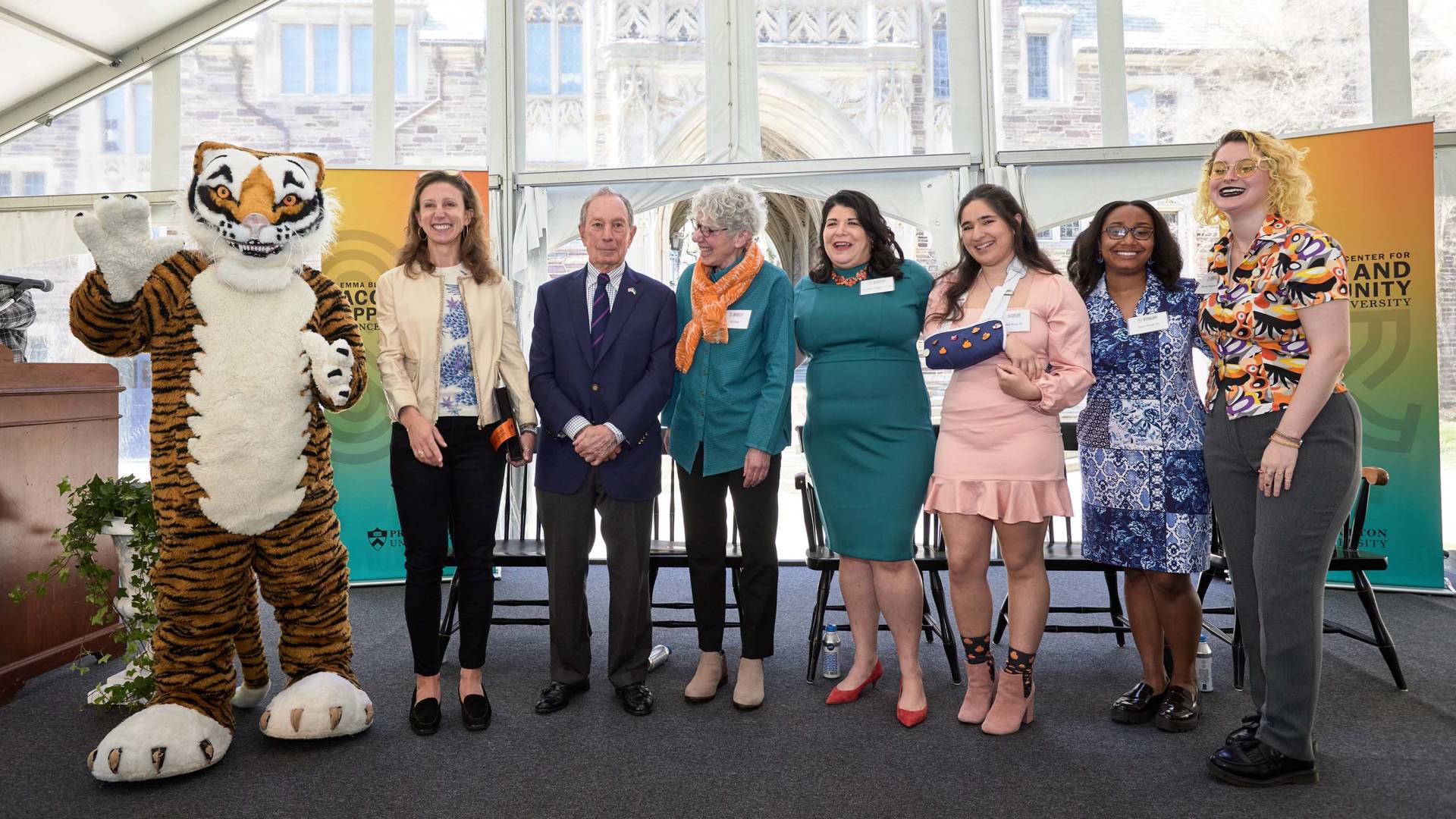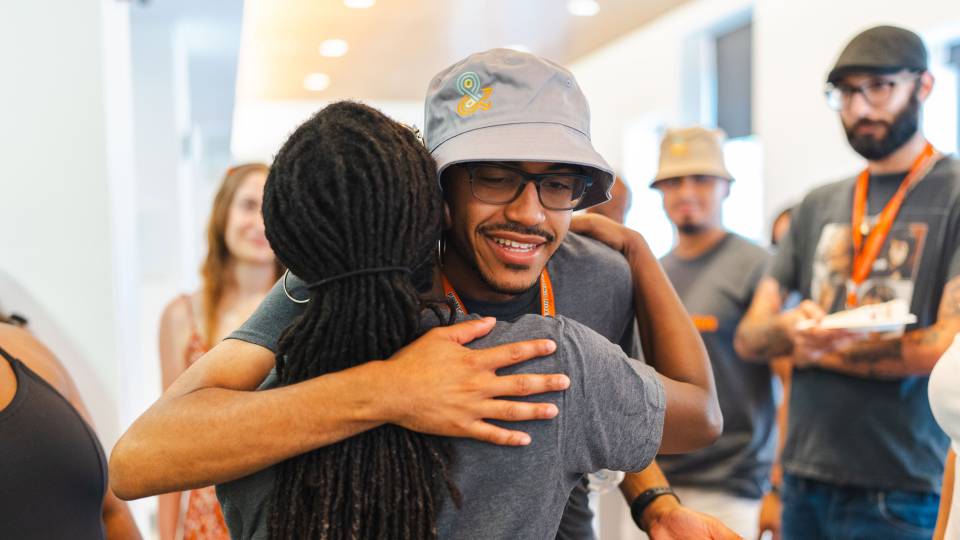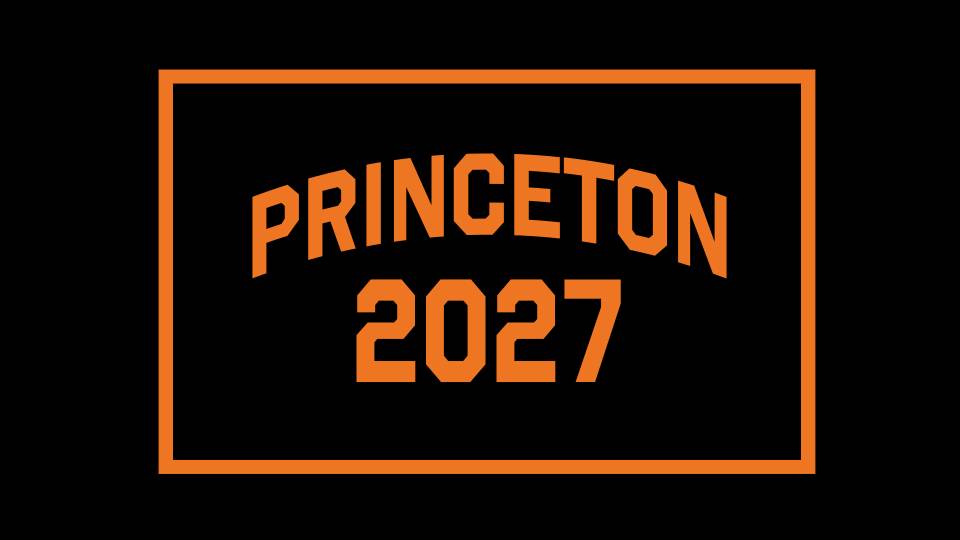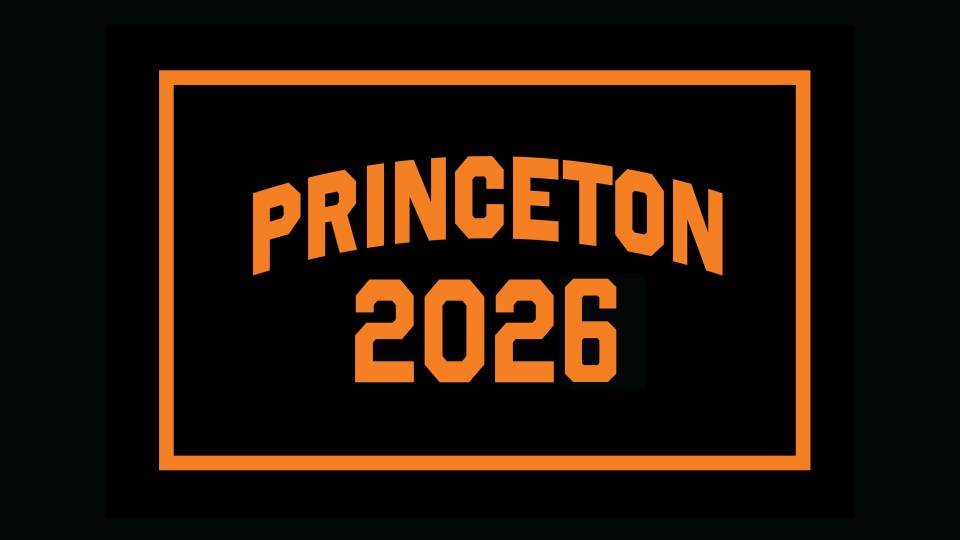On April 4, a joyful celebration brought together more than 200 members of the University community for the formal dedication of the Emma Bloomberg Center for Access and Opportunity (EBC). Pictured (from left) with the Princeton tiger mascot: Emma Bloomberg, a 2001 Princeton graduate and founder and CEO of Murmuration; Michael R. Bloomberg, founder of Bloomberg Philanthropies and Bloomberg LP and 108th mayor of New York City; Jill Dolan, dean of the college, Khristina Gonzalez, director of the EBC; and students Kaelani Burja, Alison Parish and Hannah Faughnan.
Princeton University dedicated the Emma Bloomberg Center for Access and Opportunity on April 4, celebrating the center’s work supporting the success of first-generation, lower-income, veteran and transfer students.
The Center brings together a nation-leading constellation of initiatives in college access and opportunity, including the Freshman Scholars Institute (FSI), the Scholars Institute Fellows Program (SIFP), the University’s Programs for Transfer, Non-Traditional and Veterans Students, the Mellon Mays Undergraduate Fellowship Program, the Princeton University Preparatory Program (PUPP), and the Princeton Summer Journalism Program (PSJP).
It also serves as a hub for research and innovation in the field of college access and success, and, through a partnership with the FGLI consortium(Link is external), informs and strengthens similar efforts at colleges and universities across the country.
Two years after a gift from Bloomberg Philanthropies established the center — part of the University’s Venture Forward campaign(Link is external) — Princeton graduate Emma Bloomberg ’01 and Michael R. Bloomberg, founder of Bloomberg Philanthropies, Bloomberg LP and 108th mayor of New York City, were on campus for the formal dedication at 36 University Place.

“Expanding educational access and opportunity means giving all students a chance to fulfill their potential,” said Jill Dolan, dean of the college, calling it “truly one of the most important tasks of our time.”
The ceremony also featured remarks from Jill Dolan, dean of the college, Khristina Gonzalez, the Bob Peck ’88 Director of the Emma Bloomberg Center for Access and Opportunity, and Class of 2023 member Kaelani Burja. More than 200 Princeton students, staff, and other members of the University community and Bloomberg Philanthropies gathered for the celebration under a large tent, festooned in teal, yellow and orange — the colors of the EBC logo, in the courtyard adjacent to the center on a bright spring morning.
“Expanding educational access and opportunity means giving all students a chance to fulfill their potential,” Dolan said, calling it “truly one of the most important tasks of our time.”
“Princeton and Bloomberg Philanthropies have been partners in this task for many years,” she said, “especially through the work of the American Talent Initiative, or ATI, which aims to greatly increase the number of lower-income students enrolling in and graduating from top universities and colleges in the U.S.”
“We know that a college degree has a positive impact on people’s long-term economic, social, and physical well-being,” she continued. “But getting into college is truly the first step of many on this journey. To quote Emma on this subject, she says ‘We know that getting students to college isn’t sufficient; we must do all we can to provide a comprehensive support system for all who matriculate.’”
Michael Bloomberg commended Princeton on its efforts and also cited Emma Bloomberg’s leadership in the field, including her work as founder and CEO of Murmuration, which helps improve K-12 public education and access for all children. Emma also serves on the Bloomberg Philanthropies board of directors.
“Most of my career has been in the realm of educational equity,” she said at the event. Noting her main focus on public K-12 education, she added: “The point is not a great high school education, the point is the opportunity that can unlock the ability to come to a place like Princeton, the ability to then go on and fulfill your dreams.”
Pioneering initiatives, together in one place
The Emma Bloomberg Center’s establishment in April 2021 brought together Princeton’s pioneering initiatives in college access and opportunity. The range of programs support the increasing number of Princeton undergraduates who are first-generation college and lower-income (FLi) students, as well as veteran, transfer and non-traditional students.
Today, about 21% of Princeton first-years are lower-income students eligible for federal Pell Grants (an increase from 7% in 2008) and 17% identify as first-generation college students.

“The establishment of the Emma Bloomberg Center is an affirmation that community — that care — is a critical component of education,” said Khristina Gonzalez (left), the Bob Peck ’88 Director of the Emma Bloomberg Center for Access and Opportunity. Pictured with Gonzalez: Michael R. Bloomberg (center), Jill Dolan (second from right) and Emma Bloomberg (far right).
“[A]t the heart of our great University — at the heart of its excellence — is, and must always be, a deep commitment to educational access and equity,” said Gonzalez. “We are gathered to recommit to this work — to the ongoing project of ensuring not only that all students have the chance to dream, but that they have the structural pathways and supports necessary to imagine and realize expansive possibilities for their lives.”
“The establishment of the Emma Bloomberg Center is an affirmation that community — that care — is a critical component of education,” said Gonzalez, who shared her own story of growing up in a working-class family from Poughkeepsie, N.Y., and benefitting from access programs including the Institute for the Recruitment of Teacher Program and a Mellon Mays fellowship.
She thanked Princeton President Christopher L. Eisgruber, Jill Dolan and the Bloombergs for their deep dedication and commitment — and offered special thanks to the FLi student and alumni community, “who make great things happen at this institution every day, who show up time and again to lift up those who come after them, so that their path can be a little more clear — and a lot more joyful.”
Michael Bloomberg thanked everyone at the Center for their dedicated work. “Schools like Princeton help make our country a force for good and progress,” he told the audience. “By helping more talented young people succeed here and graduate, we really can build a better and brighter future for our country.”
“As a country we need to do a much better job ensuring more high-achieving high school students go on to great schools that match their abilities — especially students from low- and middle-income families,” he said. “And we have to do a better job making sure that they have the support they need to succeed and thrive on campus and graduate ready for success.”
‘Unlock the opportunity for the rest of your life’
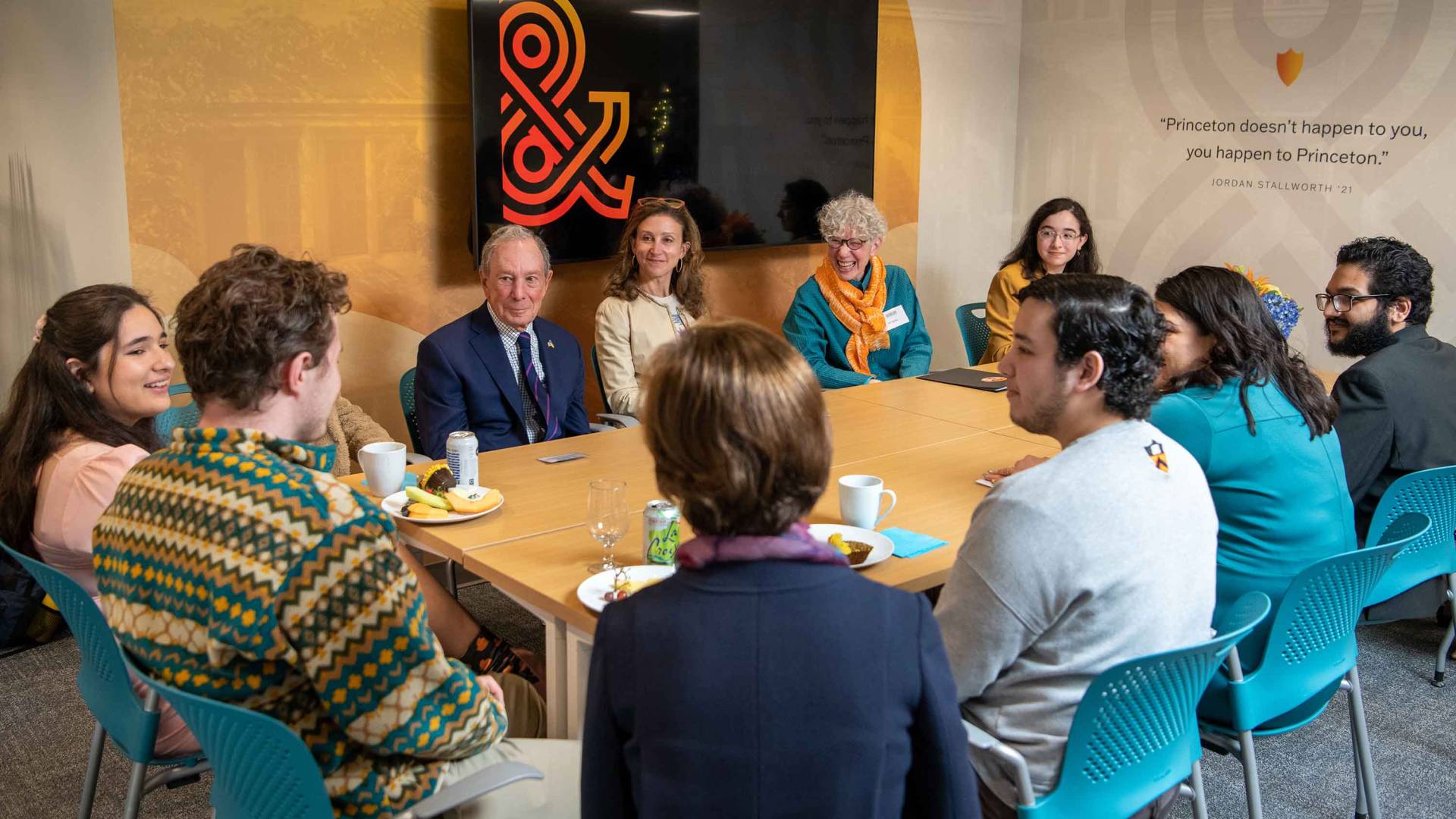
Michael R. Bloomberg and Emma Bloomberg (center) enjoy an informal roundtable conversation with a small group of students inside the center before the ceremony.
Noting how much she and her father had enjoyed an informal roundtable conversation with a small group of students inside the center before the ceremony, Emma Bloomberg said: “This is about all of us together confirming Princeton’s commitment to making sure that people from lower-income communities, people from underrepresented backgrounds, people who are first-generation college students, cannot just come here but can succeed here.”
Addressing the students in the audience, she added, “The reason all of you are here is to unlock the opportunity for the rest of your life, to think about what comes after Princeton.”
“What the Center means to me is home, it means community,” said Class of 2023 member Kaelani Burja, a first-generation student who is from Guam and Bakersfield, California, adding that she intentionally chose to live in a dorm room this year that is a “46-second walk” from the center. Burja has held several leadership roles at EBC, including FSI residential college adviser and SIFP community ambassador. She is also a Mellon Mays Undergraduate Fellow.

“[The Center] is where I found my family… giving me the confidence and the experience to pursue a great life on campus,” said Class of 2023 member Kaelani Burja, a first-generation student who has held several leadership roles at EBC.
“Because of the Freshman Scholars Institute, I never even had one moment where I felt out of place,” Burja said. “I was literally enveloped in support from my first steps on campus. That’s where I found my family… giving me the confidence and the experience to pursue a great life on campus.” She is an anthropology concentrator who is pursuing certificates in theater, music theater, Latino studies and Latin American studies. Her senior thesis project is a production that boasts a cast and crew of almost entirely FSI, SIFP and transfer students. After graduation, she is writing and performing a play in a yearlong project funded through a Martin A. Dale ’53 Fellowship.
Dolan thanked Princeton’s FLi students, many of whom were in the audience, noting how they and the programs of the Emma Bloomberg Center are changing Princeton.
“There’s a beautiful quote that I hope you all get to see on display in the Bloomberg Center from Jordan Stallworth, of the Class of 2021, that says, ‘Princeton doesn’t happen to you; you happen to Princeton,’” Dolan said.
“Indeed,” she said, “the growth of socioeconomic diversity, with first-generation and lower-income students now comprising about one third of our undergraduate population, represents probably the greatest transformation of our student body since coeducation more than 50 years ago.”
Prior to the dedication ceremony, a small group of students, the Bloomberg family, Dolan and Gonzalez enjoyed the unveiling of a new art installation created to welcome students and visitors to the center.

At the reception, guests were offered Emma Bloomberg Center for Access and Opportunity pins to celebrate the occasion.
At the reception following the formal remarks, the crowd included dozens of students who are involved in the center and have benefitted from its programs. Many of them stopped by the table where EBC staff were handing out sweatpants and beverage containers adorned with the EBC logo.
Elizabeth Deravil, Aaron Molina and Kamaula Rowe, all members of the Class of 2026, met last summer at the Freshman Scholars Institute and have been fast friends ever since.
Before arriving on campus, Deravil, of Lawrenceville, New Jersey, said, “I felt distant and scared that I wouldn’t find community. At FSI, I found people who genuinely cared about me and met professors who genuinely believed in me and my ideas.”
“The Emma Bloomberg Center is a great community,” said Molina, of Brownsville, Texas. “Before FSI, I felt lost. But we’ve all bonded and feel a sense of connection. I don’t feel isolated anymore, and I am able to flourish.”
“FSI was an important start to my Princeton experience,” said Rowe, who is from Queens. “The Emma Bloomberg Center is a great family where we can relate to each other and fall back on each other’s support.”
Extraordinary students from all backgrounds
The establishment and expansion of the Emma Bloomberg Center is an integral part of Princeton’s enduring commitment to attracting, enrolling and supporting extraordinary students from all backgrounds.

Emma Bloomberg, a 2001 Princeton graduate who has focused her career on educational equity, greets Princeton students at the reception.
In addition to Princeton’s commitment to the American Talent Initiative, the Office of Admission works with a number of college access groups that support lower-income students, first-generation students and students from underrepresented racial and ethnic backgrounds, including QuestBridge and Leadership Enterprise for a Diverse America (LEDA).
On campus, the University has begun a process to increase the undergraduate student body by 500 students. The enrollment increase, paired with an expansion of Princeton’s groundbreaking financial aid program, will ensure that more talented students from all sectors of society have access to a Princeton education. Princeton’s financial aid program is recognized as one of the most generous in the country and it relies on grants, not loans, to meet students’ full financial need.
The undergraduate expansion includes expanding Princeton’s transfer admission program, which was reinstated in 2018. The transfer program focuses on enrolling students from military, community college and non-traditional backgrounds. The University also partners with transfer support networks and veteran and military programs, including Service to School and the Warrior-Scholar Project, in preparing U.S. military veterans and service members for higher education.
The University is building new residential facilities to accommodate the larger student body. Two new residential colleges, Yeh College and New College West, opened last fall and another new residential facility, Hobson College, is under construction.
